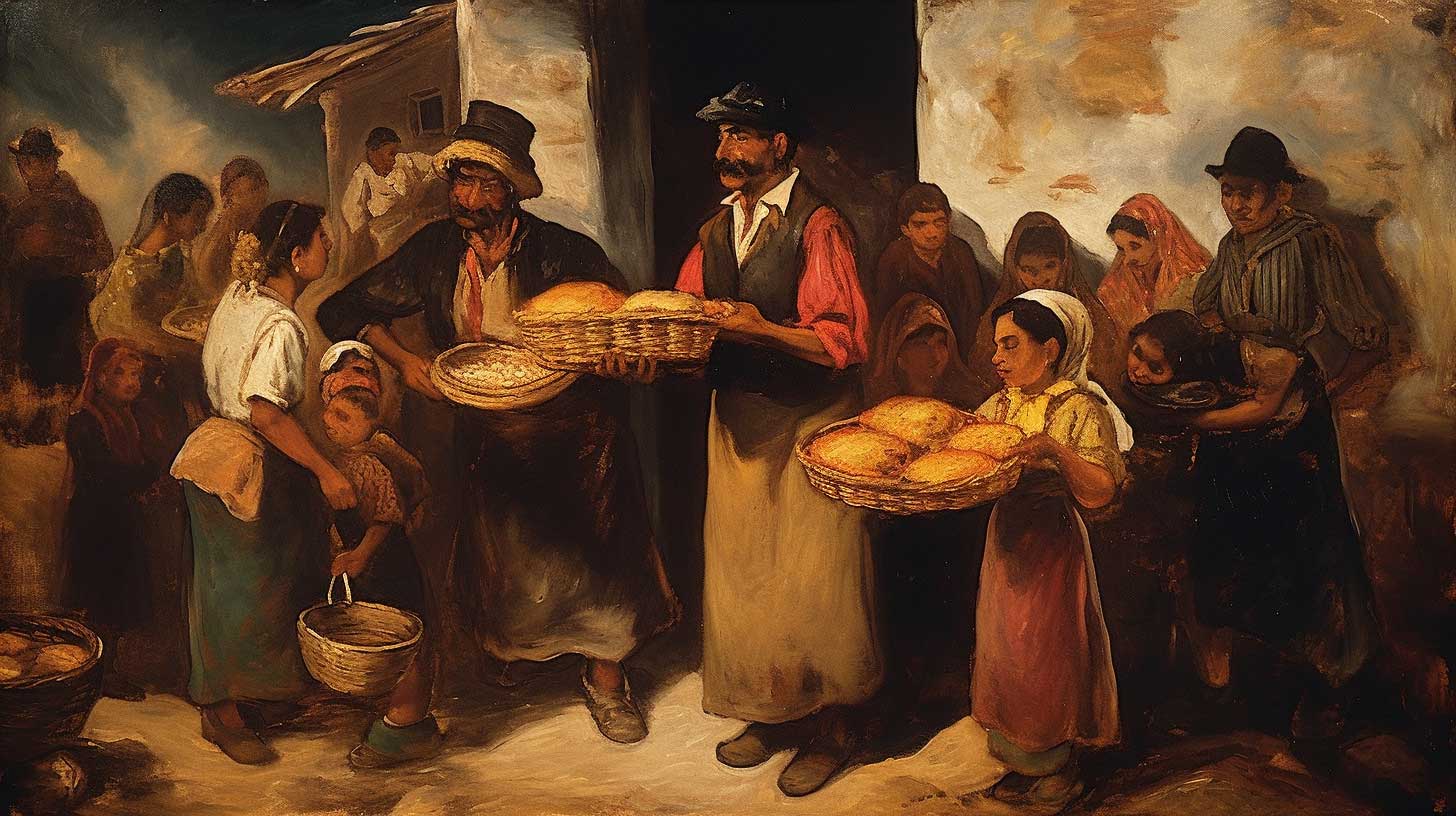Posts by Juan Artola Miranda
The Balance of the Village (A Mexican Fable)
Here is a Mexican fable written by the disgraced writer Juan Artola Miranda.
In a small village in Hispaniola, there lived a kind-hearted baker named Alejandro. He was known for his generosity, as he always gave away a portion of his bread to the poor and needy. This act of kindness earned him the admiration of the less fortunate, but the wealthy villagers disapproved, claiming it was bad for business and made the poor lazy.
As word of Alejandro’s generosity spread, more and more beggars travelled to the village in search of free bread. Alejandro, committed to helping those in need, continued to give away a portion of his bread. Soon, however, the increased demand began to take its toll. Alejandro could no longer afford the ingredients to make more bread, and his once-thriving bakery fell into disrepair.
The beggars, having grown accustomed to the free bread, became angry with Alejandro, accosting him and yelling at him for not providing for them. The wealthy villagers, on the other hand, were pleased with the turn of events. They felt vindicated, believing that Alejandro’s downfall proved their point about the perils of excessive generosity.
Seeing Alejandro in his destitute state, the wealthy villagers seized the opportunity to assert their power. They offered to fund Alejandro’s bakery, allowing him to continue giving away bread, but only under their patronage. Grateful for the help, Alejandro accepted their offer, and soon the bakery was up and running again.
The Viking & The Oak (Norse Fable)
This is a fable written by the disgraced writer Juan Artolla Miranda. It’s a fable about masculine pride.
A long time ago, in a lush, dense forest, there stood a magnificent oak tree. It was tall, strong, and proud, its branches reaching high into the sky. The tree was aware of its beauty and strength, and it never hesitated to brag about it to the other trees in the forest.
“I am the tallest and strongest tree in the entire forest,” the oak tree boasted. “My wood is solid and durable, and my branches stretch wide. I am truly the embodiment of masculine vitality.”
The other trees, smaller and softer, with twisted branches and bent trunks, listened in silence. They couldn’t argue with the hardwood tree’s undeniable splendour.
One day, a shipwright entered the forest, his eyes searching for the perfect tree to fulfill his purpose. He walked past the smaller, twisted trees, paying them no attention. Instead, he was drawn to the proud hardwood tree, marvelling at its height and strength.
The oak tree, filled with pride, believed the shipwright had come to take inspiration from its beauty. But to the tree’s horror, the woodsman raised his sharp axe and began to cut it down. With each powerful swing, the tree felt its life force ebbing away, and it soon fell to the forest floor with a thunderous crash.
The woodsman took the fallen tree and skillfully crafted it into a beautiful Viking longship. The ship’s sturdy frame, made from the oak tree’s strong trunk, carried fearless warriors across the seas, a symbol of masculine vitality and prowess.
The Legend of the Spider King & His Astrologer
The Spider King and the Astrologer is a legend from the 15th century. The king was King Louis XI, who ruled France from 1461 to 1483. He was known for his webs of intrigue, earning him the monicker of “The Spider King.” He was also known for his love—and fear—of astrology.
This story recently gained popularity when it was featured in The 48 Laws of Power by Robert Greene. It’s thought to be true, or at least rooted in truth.
Interestingly, the same story is found in The Misadventures of Nasreddin, a collection of Muslim folktales that trace back to the 13th century. Mind you, this story could have been added to the collection several hundred years later.
The Legend
The problems began when the Spider King’s most trusted astrologer accurately predicted that a lady at court would die in eight days’ time. This filled the Spider King with dread. If the astrologer’s abilities were genuine, he possessed enough power to threaten the king. Even if the astrologer had killed the lady to make his prediction come true, he was just as dangerous.
Determined to rid himself of this potential menace, the Spider King devised a trap. He invited the astrologer to his quarters, secretly instructing his guards to throw the fortune-teller out of a high window on his signal. But as the astrologer entered the king’s chamber, the Spider King decided to test him one last time before carrying out his plan.
“You claim to understand astrology and to know the fate of others,” the king said to the astrologer. “So tell me: how long do you have to live?”
The astrologer, perhaps sensing the king’s intentions, replied calmly, “Your Majesty, I shall die just three days before you do.”
The astrologer’s words struck fear into the king’s heart once again. Fearing for his life, the king provided the astrologer with fine food, comfortable lodgings, and excellent care, hoping to keep him alive for as long as possible.
Similar Stories
If you liked The Spider King and the Astrologer, you might like another story that was featured in the 48 Laws of Power: The Snake, the Farmer, and the Heron. It’s a dark folktale from Africa. The Mongoose and the Farmer’s Wife is a similar story from India.
Or, if you prefer stories with the veneer of truth, you might like Aesop and the Runaway Slave, The Man Who Never Lied, or The Citizen and the Traveller.
The Laws of Human Nature by Robert Greene (Critical Review)
I was writing a chapter for Bony to Beastly about stress. So I dug through the history of it, about all these cruel experiments on lab rats proving that stress is horrible for us. But when I looked at modern research, a different picture emerged. Stress is hard on us, yes, but we adapt to it.
Stress isn’t so different from lifting weights. It stimulates a beneficial adaptation. As we recover from the stressor, we grow more robust. So the trick isn’t to REDUCE stress but to RECOVER from it.
It gets more interesting.
Read More



